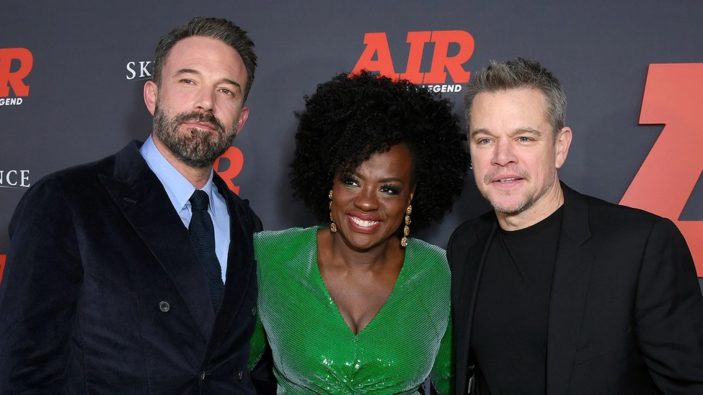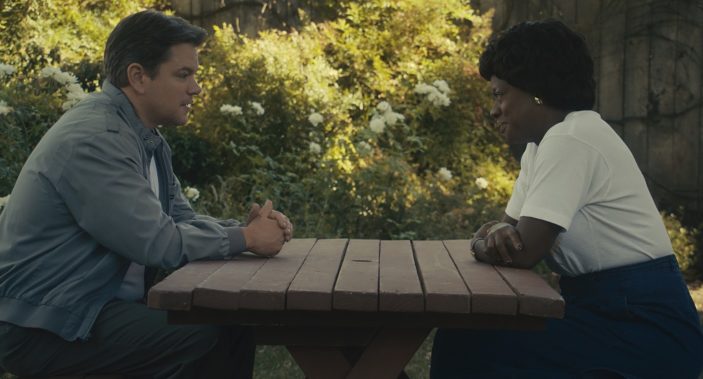
From award-winning director Ben Affleck, Air reveals the unbelievable game-changing partnership between a then-rookie Michael Jordan and Nike’s fledgling basketball division which revolutionized the world of sports and contemporary culture with the Air Jordan brand. This moving story follows the career-defining gamble of an unconventional team with everything on the line, the uncompromising vision of a mother who knows the worth of her son’s immense talent, and the basketball phenom who would become the greatest of all time.
As the film laces up to release in cinemas this week (you can read our review here), Peter Gray was invited to attend the global press conference to hear Affleck and stars Matt Damon and Viola Davis discuss their collaborative process, the importance of equity for Affleck as a filmmaker, honouring a figure such as Jordan himself, and, for Viola, how it felt knowing she was the key to getting Air off the ground.
Ben, Air feels like one of those films where it’s encompassing everything for you. It’s your love of sports, your love of filmmaking, and you’re bringing your film family in Matt Damon along with it. With those aspects, did it make the film complicated for you?
Ben Affleck: I can see how it would seem that way, but actually, for me, it made it so much easier, because this is a group of people who I had either known for a long, long time (or) have an enormous amount of respect for. Matt Maher, Chris Messina, Matt Damon, obviously, and Jason Bateman, all of whom I’ve worked with multiple times, and know well and adore and admire. And then there’s people who have sort of been life goals to work with in Viola Davis and Chris Tucker. I think Chris can attest to the number of times I’ve harassed him as he passed me by in a hotel lobby.
(Michael) Jordan really brought him around, and he’s really, really humble. I mean, (Chris) really came in and created this role. I needed him as a collaborator and as a filmmaker. His voice, his experience, his perspective…the movie is a massive failure if it’s just my voice and experience and perspective, so Chris and Viola (Davis) and Marlon (Wayans), it’s all those things that are invaluable to telling a story. So it’s actually like walking on air. That’s the media training (laughs). They told me to do that.
How did you go about, Matt, in balancing in how you told this story? It would seem there was high priorities when it came to this film; honouring the sport, honouring the cast brought along, and honouring Michael Jordan.
Matt Damon: Well, let’s see. It all started with the script, really, and that’s down to Alex (Convery). I just thought it was so great, and I didn’t know the story, and then it was kind of a step-by-step (process) because that first step was getting the blessing of Michael Jordan. Before we got too excited, Ben said we should go see him. My kids were up to something in New York and I couldn’t go, so Ben went to Florida to see Michael, and Michael’s like “It’s fine if you make the movie. It’s okay with me.” But Ben wanted to know what is most important to him. And it was out of that meeting that he said George Raveling (former American basketballer and coach) and Howard White (the now Vice President of Jordan Brand), and then he started to talk about his mom and dad.
Michael’s a very intimidating guy. And he’s an icon and all of these things, and he has all this meaning for all of us, but Ben said he had this look on his face when he spoke about his mom that he’d never seen before. So then we felt like, “Okay, now we know what this movie is, right?” Then the only bad news was we had to get Viola Davis. And if we don’t get Viola Davis, we can’t make a movie. So that was when we started thinking about how to expand Deloris (Michael’s mother).
And that’s really one of the great thing about this cast is that everybody is a filmmaker. Viola is an A-list producer. The Woman King, anybody? Marlon (Wayans) and Chris (Tucker), they’re writers as well as actors. They’re filmmakers. And Jason Bateman’s a director, a producer…you know, so that’s what we like (when) we can lean on our actors. You lean into what your actors are bringing.
The greatest basketball player in the world says that only you, Viola, can play his mother. Talk about a phone call!
Viola Davis: That’s a phone call I didn’t get. But you get a trickle-down message. I go in with a sense of “Do I belong?” Imposter syndrome. It’s nice to feel wanted. But then the next thought is stepping into the role, and if you watch videos on Deloris Jordan, she is a study in zen neutrality. The woman is very, very steady and quiet. I would imagine that even when she gets mad, she’s probably very, very steady. To envelop that spirit and everything was a challenge for me, because I’m the woman who always has a chip on her shoulder. I go in bombastic. It was both flattering and challenging, and then just a joy to work with Matt and Ben, and all these terrific actors that I still talk about. One of the greatest experiences.

And Matt, not to take anything away from your performance as Sonny, but you were joking about the physical transformation that Ben put you through. But more than that, what was great about what you did with him is that sort of uncompromising pigheadedness that one has when achieving an impossible dream. That’s something kind of hard to feel empathetic with sometimes, but you made Sonny such a loveable character.
Matt Damon: It was all really there on the page that Alex wrote. With Sonny we were really trying to capture the spirit of these people in this time, more than anything. All the people on the Nike side, independent of one another, have talked about how this time was such nostalgia, and that’s what we were trying to create. Remind people that they were the underdog, which is a weird way to think of Nike now. Before this incredible deal, they were really these kind of renegade outsiders, so we were trying to (show) all the infectious energy they had. It was really jumping off the page of the script.
Artist equity seems to be one of the major creative components of this film. Ben, I’d love for you to talk about how you set that up, the motivation behind it, and how it’s been working through this film?
Ben Affleck: Well, it’s interesting because the movie thematically kind of paralleled the things we were trying to do (and) that we had ambitions for philosophically. We wanted to raise money to create a kind of a mini-sort of studio, and in some ways what Nike wanted to do, which was change the rules a little bit, changed how the process was undergone, and also ultimately fundamentally ended up changing the way compensation worked to afford more responsibility (and to) reward the people. I really firmly believe the artists behind the camera who make a massive difference in the quality and cost and the experience of your movie are not compensated appropriately. Also, to sort of eliminate waste and streamline that process so that the important things are kept, and sort of the stuff that has to do with with ego is left behind.
It was a function of my experience over the years of talking to other directors and wondering “Why are we doing this?” It’s a very humble aspiration. I mean, we’re trying to change things a little bit, which is a very difficult thing, because we have a model that we’ve inherited in terms of how films are made from the 30’s and 40’s, with big cameras and slow film and lots of lights and certain crew structure. I certainly don’t liken myself to the profound and significant way in which (Michael’s) deal not only changed Michael’s life, but had a ripple effect for hundreds of billions of dollars for athletes down the line. It was a step in that direction, and we’re trying to take a similar step, because that’s how you get the best work. I believe you spend more on better gifted people (and) recognising their value. If you value alternate voices and collaborations you hopefully can have a company that’s known for making original, interesting stories about people and what they say and how they relate to one another that generates empathy. And we can be a supplier of films that people like.
Air is screening in Australian theatres from April 5th, 2023.
